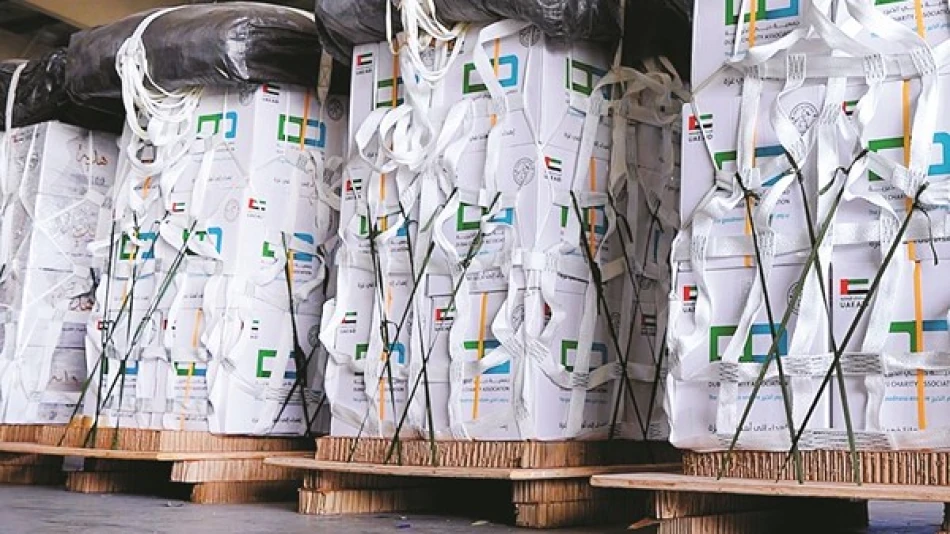
UAE's Humanitarian Aid to Gaza: A Transformative Shift in Emergency Response
UAE's Gaza Aid Operations Emerge as Critical Lifeline Amid Worsening Humanitarian Crisis
The United Arab Emirates has positioned itself as a leading humanitarian force in Gaza, with officials and experts crediting Emirati aid operations for creating a qualitative shift in crisis response and preventing widespread famine. Through innovative air and sea bridge operations, the UAE has delivered essential food and medical supplies to areas previously cut off from international assistance, demonstrating how regional powers can fill critical gaps when traditional aid channels fail.
Breaking Through the Humanitarian Blockade
Palestinian Presidential Advisor Dr. Mahmoud Al-Habbash emphasized that humanitarian conditions in Gaza have become unbearable, with expanding suffering and mounting famine risks. The UAE's response has included emergency relief convoys, field hospital construction, and sophisticated air and sea bridge operations that have successfully penetrated areas where conventional aid delivery had become impossible.
The Emirati approach represents a pragmatic solution to logistical nightmares that have plagued international relief efforts. While traditional aid routes face bureaucratic delays and security concerns, the UAE's "Operation Noble Knight 3" and "Birds of Goodness" campaigns have maintained consistent supply lines even during the most complex operational periods.
Regional Leadership in Crisis Response
The UAE's Gaza operations mirror its established pattern of rapid humanitarian deployment seen previously in Yemen, Syria, and Afghanistan. This approach contrasts sharply with the slower, committee-based responses typical of larger international organizations, offering a model for how middle powers can leverage their resources for maximum humanitarian impact.
Measurable Impact on Ground Conditions
Palestinian researcher Mahmoud Shaker noted that UAE aid has achieved concrete results beyond symbolic gestures. The Emirates has secured food supplies for popular kitchens and maintained bakery operations, directly addressing the daily reality of famine that has moved from potential threat to lived experience for Gaza residents.
Hospitals are now receiving cases of acute malnutrition, with some deaths from starvation recorded, particularly among children. Against this backdrop, the influx of Emirati supplies has reportedly reduced prices for essential goods that had become virtually unobtainable through normal channels.
Strategic Implications for Regional Diplomacy
The UAE's prominent humanitarian role in Gaza serves multiple strategic purposes. It reinforces Abu Dhabi's position as a responsible regional power capable of independent action, while demonstrating continued solidarity with Palestinian causes despite the Abraham Accords normalization with Israel.
This balancing act showcases how Gulf states can maintain humanitarian commitments while pursuing broader diplomatic objectives, potentially offering a template for other nations navigating complex regional relationships.
International Recognition and Coordination Challenges
European Union Mission spokesman Shadi Othman described the UAE's airdrop operations as among the most prominent humanitarian initiatives helping break the suffocating humanitarian deadlock. He emphasized that any initiative contributing to crisis mitigation proves far superior to waiting for slow or absent solutions.
However, the massive scale of destruction and continuously growing humanitarian needs make it difficult to determine the total aid quantities required to fully resolve the crisis. The UAE's operations, while significant, highlight the need for expanded international coordination and accelerated aid delivery mechanisms.
Sustainability and Scale Questions
The success of UAE operations raises important questions about the sustainability of aid delivery methods and whether other regional powers will follow similar models. The Emirates' ability to maintain supply lines during peak crisis periods suggests that well-resourced middle powers may be better positioned than traditional international organizations to respond to rapidly evolving humanitarian emergencies.
As the humanitarian situation continues to deteriorate, the UAE's Gaza operations may serve as a crucial case study for crisis response innovation, demonstrating how regional leadership can complement rather than compete with international humanitarian architecture.
Most Viewed News

 Layla Al Mansoori
Layla Al Mansoori






